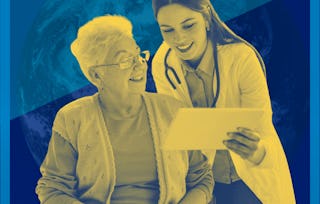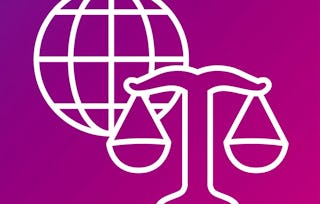What are the ways that climate change impacts human health? How can healthcare professionals support patients and communities to adapt to a changing climate? This short course explores the deep and complex connections between climate change and health for individuals and communities. By completing this course, students, trainees, practicing healthcare professionals and administrators will learn how to integrate climate awareness into their daily practice to inform and protect their patients and communities. While knowledge of human health is helpful, this is an introductory course with no required prerequisites.

Climate and Health for Healthcare Professions
Ends soon: Gain next-level skills with Coursera Plus for $199 (regularly $399). Save now.

Climate and Health for Healthcare Professions
This course is part of Healthcare Leadership for Climate Change Specialization


Instructors: Valerie K. Sabol
Included with
What you'll learn
Describe how the quest for economic development has caused the climate to change in ways that threaten human health and wellbeing, often inequitably
Explain the environmental harms and preparedness, resiliency, and sustainability challenges of healthcare practices and systems
Integrate a climate-informed approach to patient care through a health-equity lens
Act on climate change, sustainability, and health with motivation and confidence
Skills you'll gain
- Environmental Issue
- Community Health
- Climate Change Mitigation
- Climate Change Adaptation
- Health Equity
- Public Health
- Leadership Development
- Public Health and Disease Prevention
- Health Systems
- Patient Communication
- Health Education
- Environmental Science
- Patient Education And Counseling
- Health Care
- Social Determinants Of Health
- Health Policy
- Sustainable Development
- Advocacy
Details to know

Add to your LinkedIn profile
4 assignments
See how employees at top companies are mastering in-demand skills

Build your subject-matter expertise
- Learn new concepts from industry experts
- Gain a foundational understanding of a subject or tool
- Develop job-relevant skills with hands-on projects
- Earn a shareable career certificate

There are 4 modules in this course
Welcome to the course! We’ll begin by providing some introductory materials to set you up for success in the course. Then, the module explores how climate change is impacting the health of the planet Earth, our home. You will learn about how climate change exacerbates health and wellbeing disparities, and the role that social and economic vulnerabilities play in increasing risk. We will also introduce the Planetary Health framework to help make sense of these global-scale changes and work toward solutions for those most impacted. How are land use, water, biodiversity and climate changing in ways that affect our health and wellbeing? How do natural hazards interact with communities to produce disasters? And critically, how can we change our thinking to recognize that some people and places need more focused resources to thrive while others can stand to reduce their consumption without compromising wellbeing? Finally, you will hear firsthand from people working in health-related fields about how climate disruption is impacting their communities in unique ways and what solutions they are exploring for resilience.
What's included
11 videos14 readings1 assignment2 discussion prompts
This module explores both the climate impact and vulnerability of healthcare systems and provides concrete examples of efforts to reduce carbon footprint and build resilience. You will first learn about the climate impact of healthcare systems, particularly focusing on their greenhouse gas contributions. We will consider changes some healthcare systems have made to reduce their carbon footprint. The second part of this module will discuss how stresses and disruptions from our changing climate threaten the functioning of healthcare systems. You will learn about how healthcare systems can collaborate with their local and state governments and community organizations to make communities safer and better prepared.
What's included
10 videos14 readings1 assignment1 discussion prompt
This module examines the intersection of climate change and health, emphasizing the direct and indirect health impacts of climate change on individuals within their communities. You will gain insights into the environmental determinants of health and the complex ways in which climate change amplifies health inequity. Then, you will be introduced to climate-informed clinical skills such as communicating environmental risks, developing adaptation and resilience strategies, and preparing for emergencies to optimize wellbeing in a shifting climate.
What's included
9 videos16 readings1 assignment1 discussion prompt
This module discusses how health professionals can expand their roles and influence as climate and equity-informed educators, organizers, researchers, advocates, and systems change agents. You will learn specific communication strategies and have opportunities to connect your own knowledge, skills, and values with key themes from this course. By reviewing examples of how health professionals have led systems-level and community efforts to mitigate, adapt to, or build resilience to climate change, you will learn why working together with others is essential to effective climate action.
What's included
18 videos14 readings1 assignment3 discussion prompts
Earn a career certificate
Add this credential to your LinkedIn profile, resume, or CV. Share it on social media and in your performance review.
Offered by
Explore more from Public Health
 Status: Free Trial
Status: Free TrialDuke University
 Status: Free Trial
Status: Free TrialImperial College London
 Status: Preview
Status: PreviewYale University
 Status: Free Trial
Status: Free TrialUniversity of Michigan
Why people choose Coursera for their career




Frequently asked questions
To access the course materials, assignments and to earn a Certificate, you will need to purchase the Certificate experience when you enroll in a course. You can try a Free Trial instead, or apply for Financial Aid. The course may offer 'Full Course, No Certificate' instead. This option lets you see all course materials, submit required assessments, and get a final grade. This also means that you will not be able to purchase a Certificate experience.
When you enroll in the course, you get access to all of the courses in the Specialization, and you earn a certificate when you complete the work. Your electronic Certificate will be added to your Accomplishments page - from there, you can print your Certificate or add it to your LinkedIn profile.
Yes. In select learning programs, you can apply for financial aid or a scholarship if you can’t afford the enrollment fee. If fin aid or scholarship is available for your learning program selection, you’ll find a link to apply on the description page.
More questions
Financial aid available,





